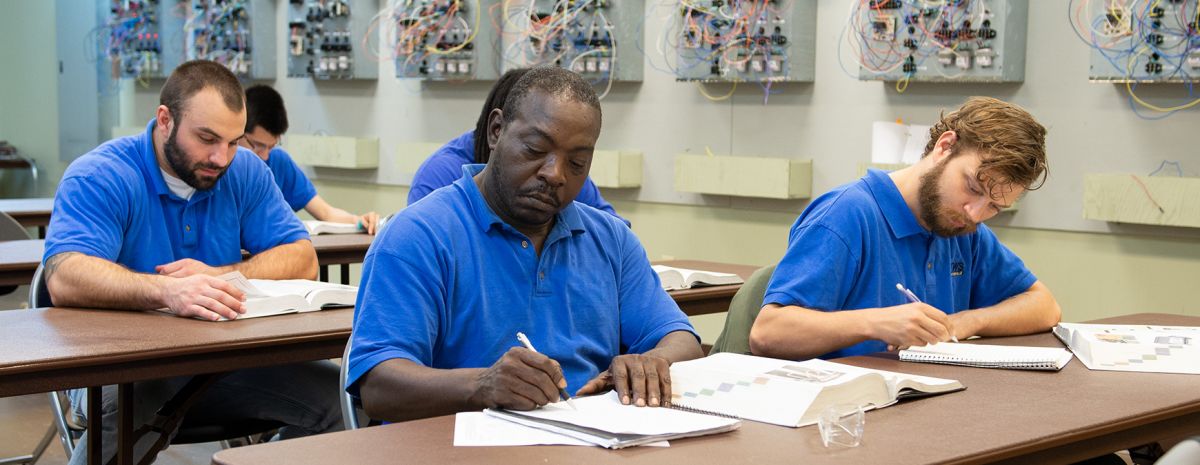RSI is a Great Training Option for Everyone
Learn more about how we can prepare you to advance your career.
Are you ready to become an HVAC technician? Want to know how long it will take to become good at HVAC? Nothing worth doing is ever easy, but with the help of The Refrigeration School (RSI), you can start installing, maintaining, and repairing HVAC systems in no time.
How Long Does It Take to Become Good at HVAC?
Training is required to become good at HVAC. You have two options:
Option #1: Apprenticeship
The first option is to start an apprenticeship without completing an HVAC technician program at a trade school. You start working and earning right away. However, there are some disadvantages. Getting good at HVAC may take the complete four years you are an apprentice, and you will never know what you don’t know. As an apprentice, you may be relegated to installing air conditioners but never get the opportunity to fix a heating system or install a ventilation system in a commercial setting. Going the apprenticeship-only route can leave gaps in your knowledge. Fortunately, The Refrigeration School (RSI) can help fill those gaps with our HVAC technician program.
Option #2: HVAC Technician Program
Get Started on the Path to a New Career
Fill out our form to learn how we can help you change your life.
The best option for you to become good at HVAC is to complete the HVAC technician program at RSI. In as little as six months, you can complete the HVAC curriculum and gain the knowledge and experience you need to become good at HVAC.
You not only attend lectures, but you get to work on real-world HVAC systems. You will use the industry-standard HVAC tools and equipment you find on the job. Plus, you can make mistakes without catastrophic consequences. While you train, you are closely guided by industry-experienced instructors who offer direct feedback to help you build confidence in your skills.
What Do You Learn During the HVAC Technician Program?
RSI offers a complete curriculum in HVAC systems. You will learn how to install, repair, and maintain heating, ventilation, and air conditioning systems. The courses in this program include:
Fundamentals of Electricity
This course offers a basic electrical understanding from an elemental stage. You learn schematic wiring, test meter usage, and safety processes for handling electrical systems, including grounding and energized circuits.
Fundamentals of Refrigeration
An introduction to the refrigeration cycle, the mechanical and physical properties of refrigerants, and the refrigeration cycle. You will learn to use manifold gauge sets, vacuum pumps, service wrenches, charging tools, and recovery equipment.
Comfort Systems – Residential and Commercial
A review of HVAC systems for residential and commercial use. You learn about split systems, packaged heat pump systems, air conditioners, gas furnaces, and evaporative coolers. You are tasked with building schematics for air conditioning and heating systems and then wiring those systems.
Refrigeration Systems and Practices
This course teaches you how to maintain, monitor, and manage residential—and commercial-grade walk-in refrigerators and freezers. You will also learn how to change out a compressor, service and repair critically charged systems, and gain an overall understanding of mechanical and electrical troubleshooting.
Advanced Troubleshooting Techniques
A course on reciprocating liquid chillers and stands, E-STAR1 training to hone troubleshooting skills, mechanical troubleshooting, and schematic wiring. At the end of the program, you will be prepared for the EPA Section 608 certification exam2.
Want To Learn More?
Ready to start your new career at one of the best HVAC schools in Phoenix? Because HVAC is a hands-on job, technical training is typically required for anyone to enter this field. Many people invest in a trade program to learn the trade skills they need to be safe and effective as professionals. To learn more about our HVAC program offered at the Phoenix, AZ campus, contact us at The Refrigeration School or call 1-888-671-5803.
- https://www.energystar.gov/products/what_makes_product_energy_star
- https://www.epa.gov/section608/section-608-technician-certification-requirements
Additional Sources




